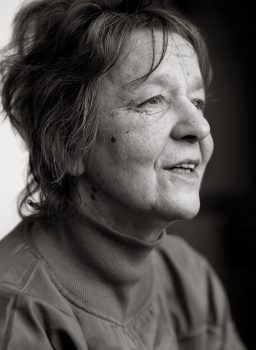Search results for "herbert lomas/www.booksfromfinland.fi/2004/09/no-need-to-go-anywhere"
The situation in Narva
31 December 1993 | Archives online, Fiction, Prose
A short story from Pakosarja (‘Exhaust manifold’, WSOY, 1993)
We went into the building where Voroshilov said the waitress had disappeared. Inside was a big room lined with wooden benches. A tin-clad stove radiated heat. Someone had shut the dampers too early, probably out of meanness; it had that kind of smoky smell.
A corridor led from the room, with a few doors off it. We peered inside, but there was no one to be seen. There was nobody in the entire building. We left.
We walked across the railway yard in what I thought was the direction of the train. We heard the sound of the engine long before we could see anything through the snowstorm. At regular intervals the engine’s pressure valve let off steam. Voroshilov went for a leak. He leaned against the engine’s big back wheel and watered the lever, which had been left in the down position. The liquid ran down the engine’s rounded flank. The snowflakes melted as they fell on to the black casing of the water-tank. More…
One hell of a time
31 December 1997 | Archives online, Fiction, Prose
Extracts from Lanthandlerskans son (‘Country shopkeeper’s son’, Söderströms, 1997). Brooklyn Bridge, Christmas Eve: Otto, a Finland-Swede, attempts to start a new life in 1930s America, where swindlers and even gangsters can, he finds, be duped – even Al Capone. Otto’s grandson listens to his story on tape
I have always loved that sight. A city that you see from the air at night, all lit up. It’s’ beautiful – and at the same time so frightening. I don’t really know how to describe it.
Well, it was Christmas Eve. I was wandering around New York. I had eaten at an automat. Do you know what that is? They don’t exist any more, but in the Twenties and Thirties they were common in America. It’s a cafe, but they didn’t have any staff or waiters, instead the walls were full of little glass boxes where the food was on display. You could select what you wanted – sandwiches and pies and salads, anything. Then you put your nickels and dimes in a slot beside the box and the glass opened and’all you had to do was take out the plate. I was fond of the automats. I liked just sitting there and watching other people eat, no one bothered about you, you were left alone and that suited me. When I’d finished eating I went outside again and somehow or other I wandered upon to Brooklyn Bridge. There was a lot of traffic, people were on their way home. Well, just as I was walking there alone in the company of my thoughts I heard someone shouting ‘Help! Help me!’ More…
What’s so great about paper?
17 September 2009 | Articles, Non-fiction

High-tech: the ultimate gadgets of the 15th century, parchment and pen. A portrait of Jean Miélot, the Burgundian author and scribe, by Jan Tavernier (ca. 1456)
The day will soon come when commuters sit on a bus or train with their noses buried in electronic reading devices instead of books or newspapers. Teemu Manninen takes a look at the digital future
Most people interested in books are aware of the arrival of electronic reading devices such as the Amazon Kindle, a kind of iPod — the immensely popular portable music listening device made by the company Apple — for electronic books. For a literary geek like me, the Kindle and e-readers should be the ultimate gadget: a whole library in a small, paperback-sized device. However, I’ve been wondering why digital reading hasn’t become as popular as digital listening. I myself have not invested in an e-reader, although I ought to be exactly the desired kind of customer. After all, I read all the time. Even the mp3 player I have is mostly used for listening to audio books. More…
Letters from Tove
6 October 2014 | Extracts, Non-fiction
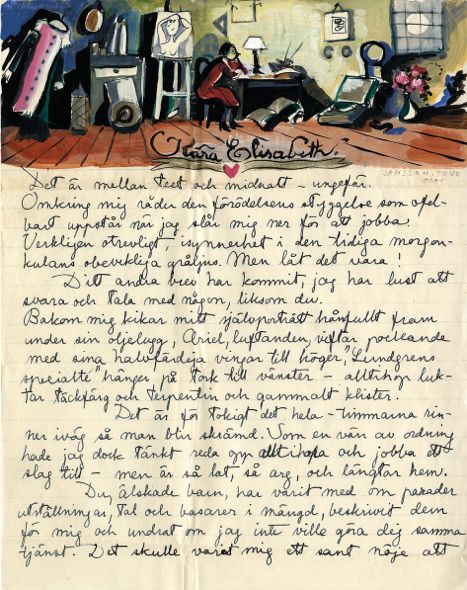
Early days: Tove Jansson went to Stockholm to study art when she was just 16. A letter to her friend Elisabeth Wolff, from November 1932
Artist and author Tove Jansson (1914–2001) is known abroad for her Moomin books for children and fiction for adults. A large selection of her letters – to family, friends and lovers – was published for the first time in September. In these extracts she writes to her best friend Eva Konikoff who moved to the US in 1941, to her lover, Atos Wirtanen, journalist and politician, and to her life companion of 45 years, artist Tuulikki Pietilä.
Brev från Tove Jansson (selected and commented by Boel Westin and Helen Svensson; Schildts & Söderströms, 2014; illustrations from the book) introduced by Pia Ingström
7.10.44. H:fors. [Helsinki]
exp. Tove Jansson. Ulrikaborgg. A Tornet. Helsingfors. Finland. Written in swedish.
to: Miss Eva Konikoff. Mr. Saletan. 70 Fifty Aveny. New York City. U.S.A.
Dearest Eva!
Now I can’t help writing to you again – the war [Finnish Continuation War, from 1941 to 19 September 1944] is over, and perhaps gradually it will be possible to send letters to America. Next year, maybe. But this letter will have to wait until then – even so, it will show that I was thinking of you. Curiously enough, Konikova, all these years you have been more alive for me than any of my other friends. I have talked to you, often. And your smiling Polyfoto has cheered me up and comforted me and has also taken part in the fortunate and wonderful things that have happened. I remembered your warmth, your vitality and your friendship and felt happy! At first I wrote frequently, every week – but after about a year most of it was returned to me. I wrote more after that, but the letters were often so gloomy that I didn’t feel like saving them. Now there are so absurdly many things I have to talk to you about that I don’t know where to begin. Koni, if only I’d had you here in my grand new studio and could have hugged you. After these recent years there is no human being I have longed for more than you. More…
Do not be afraid
30 June 1998 | Archives online, Fiction, poetry
Poems from Älä pelkää (‘Do not be afraid’, WSOY, 1997). Introduction by Jyrki Kiiskinen
Travel preparations
Late Friday night. Strange noises in the yard, someone
bangs on the door to the next stairway. Electricity hums.
I have just come back from the U.S. and France, from Sweden too.
On their channels, people laugh. They are having fun.
They are, nowadays, strange, young, and handsome, each and every one.
We did not have that when I was young. We limped.
We did not talk. We stammered tortuous phrases
and, while embracing, were afraid to be seen.
We did embrace. We clung to one another, expecting
to drown alone in every ninth wave.
I know my place is not here where I am. I think, I try
to construct conclusions. Someone looks over my shoulder.
Slowly the universe was born out of my mother s womb.
I am not responsible for its sudden extinction. On a Friday night.
I let them rule, the beauties and young lovers. My ticket has been written.
it is ready. I have had my shots against fear. I have my passport.
Bulldog
No European he who does not every morning
put on a tie. This morning, European
as I am, I looked at myself in the mirror
and noted that, incontrovertibly, more
and more every day, I resemble a
sad bulldog. Who has ever seen a bulldog smile?
We know we were born into the wrong world,
born to struggle. My bloodshot eyes tell me
I would like nothing better than to bed down m the straw
with my adversary, the bull, and ponder the stars.
Paradise apple
Consciousness is anchored to dark matter
as are the swells to the ocean. It is a quality
of matter, darkness glittering darkness. No need for words,
the overarching multidimensional web is one seamless
thought, not verifiable by observations or signs.
As soon as light penetrates the ambiguity of being,
the fruit falls outside the bounds of paradise.
The first sense
For another moment, you are incomprehensibly close,
you are mental image, you are voice, almost scent.
Only touch is missing, the most elementary of sensations
but precisely the one with which God tested the clay
with which the worm knows itself
with which there is hurt in torture and love,
and with which I miss your retreating appearance,
your tender groin, your rough hand.
(Written after a telephone conversation.)
Translated by Anselm Hollo
Maailman paras maa [The best country in the world]
14 March 2013 | Mini reviews, Reviews
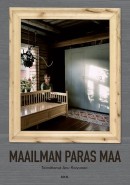 Maailman paras maa
Maailman paras maa
[The best country in the world]
Toim. [Ed. by] Anu Koivunen
Helsinki: Suomalaisen Kirjallisuuden Seura, 2012. 255 p., ill.
ISBN 978-952-222-347-0
€ 37, paperback
In this book twelve writers, representing various fields of research, ponder Finland and Finnishness from the viewpoint of history, ethnology, society, culture and economics. Finland-Swedishness and the relationship between Finns and Russians, the need of Finns to defend their participation in the Second World War in alliance with Germany as a ‘separate war’, and the nostalgia related to lost Karelia. The articles deal with Finland facing economic challenges, attitudes towards foreign beggars and self-critical Finnish opinion pieces. They also take a look at Finnish man as portrayed in the classic novel Seitsemän veljestä (‘The seven brothers’, 1870, by Aleksis Kivi) and in a recent prize-winning film about men talking in the sauna about their feelings, and discuss the relationship of the two national languages, Finnish and Swedish. Well-written and original articles question truisms and challenge the reader contemplate his or her own relationship with Finnishness.
Girls just want to have fun
3 October 2013 | Essays, Non-fiction, On writing and not writing
In this series, Finnish authors ponder the complexities of their profession. Susanne Ringell describes her work as sailing on sometimes stormy seas – without a skipper certificate, but with conviction
We are such stuff as dreams are made on; / and our little life is rounded with a sleep. (William Shakespeare, The Tempest.) In Swedish – my mother tongue and the language in which my pencil writes – the play is called Stormen, ‘The storm’. There are a lot of storms on the sea of dreams. The sky suddenly grows dark, and deceptive whirlwinds blow up, there are cold shivers and tornadoes, there is the Bermuda Triangle and the mighty chasm of the Mariana Trench. In its southern part is the world ‘s deepest marine environment, Challenger Deep, 11 kilometres. Our boats are small and fragile, and it ‘s a miracle they haven’t capsized more often.
It’s a miracle that in spite of it all we still so frequently reach our home harbour, that we arrive where we were bound for. Or somewhere else, but we do get there. We come ashore, we come ashore with what we set our minds on. More…
Serious comics: Angoulême 2011
24 February 2011 | This 'n' that

Graphic artist Milla Paloniemi went to Angoulême, too: read more through the link (Milla Paloniemi) in the text below
As a little girl in Paris, I dreamed of going to the Angoulême comics festival – Corto Maltese and Mike Blueberry were my heroes, and I liked to imagine meeting them in person.
20 years later, my wish came true – I went to the festival to present Finnish comics to a French audience! I was an intern at FILI – Finnish Literature Exchange, and for the first time, FILI had its own stand at Angoulême in January 2011.
Finnish comics have become popular abroad in recent years, which is particularly apparent in the young artists’ reception by readers in Europe. Angoulême isn’t just a comics Mecca for Europeans, however: there were admirers of Matti Hagelberg, Marko Turunen and Tommi Musturi from as far away as Japan and Korea.
The festival provides opportunities to present both general ‘official’ comics, ‘out-of-the-ordinary’ and unusual works. The atmosphere at the festival is much wilder than at a traditional book fair: for four days the city is filled with publishers, readers, enthusiasts, artists, and even musicians. People meet in the evenings at le Chat Noir bar to discuss the day’s finds, sketching their friends and the day’s events.
As one Belgian publisher told me, ‘There have always been Finns at Angoulême.’ Staff from comics publisher Kutikuti and many others have been making the rounds at Angoulême for years, walking through the city and festival grounds, carrying their backpacks loaded with books. They have been the forerunners to whom we are grateful, and we hope that our collaboration with them deepens in the future.
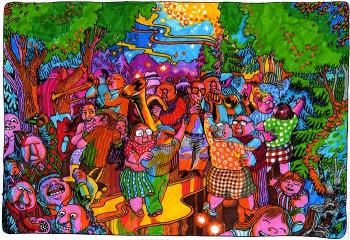
Aapo Rapi: Meti (Kutikuti, 2010)
This year two Finnish artists, Aapo Rapi and Ville Ranta were nominated for the Sélection Officielle prize, which gave them wider recognition. Rapi’s Meti is a colourful graphic novel inspired by his own grandmother Meti [see the picture right: the old lady with square glasses].
Hannu Lukkarinen and Juha Ruusuvuori were also favorites, as all the available copies of Les Ossements de Saint Henrik, the French translation of their adventures of Nicholas Grisefoth, sold out. There were also fans of women comics artists, searching feverishly for works by such artists as Jenni Rope and Milla Paloniemi.
Chatting with French publishers and readers, it became clear that Finnish comics are interesting for their freshness and freedom. Finnish artists dare to try every kind of technique and they don’t get bogged down in questions of genre. They said so themselves at the festival’s public event. According to Ville Ranta, the commercial aspect isn’t the most important thing, because comics are still a marginalised art in Finland. Aapo Rapi claimed that ‘the first thing is to express my own ideas, for myself and a couple of friends, then I look to see if it might interest other people.’
Hannu Lukkarinen emphasised that it’s hard to distribute Finnish-language comics to the larger world: for that you need a no-nonsense agent like Kirsi Kinnunen, who has lived in France for a long time doing publicity and translation work. Finnish publishers haven’t yet shown much interest in marketing comics, but that may change in the future.
These Finnish artists, many of them also publishers, were happy at Angoulême. Happy enough, no doubt, to last them until next year!
Translated by Lola Rogers
Henriikka Tavi wins the Dancing Bear Poetry Prize
1 March 2012 | In the news
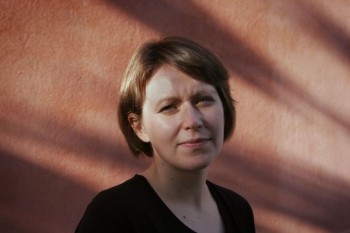
Henriikka Tavi. Photo: Heini Lehväslaiho
The Dancing Bear Poetry Prize, worth €3,500, is awarded annually by the Finnish Broadcasting Company to a book of poetry published the previous year. The prize has been awarded since 1994.
This year’s winner – announced on 27 February – was Henriikka Tavi for her new collection, Toivo (‘Hope’, Teos; see the selection of her poems, translated by David Hackston, we published in December, as well as the introduction by Mervi Kantokorpi).
According to the jury, Tavi’s Toivo, reflecting and contemplating sorrow and loss with its childlike imagery of lullabies and butterflies, creates a feeling of togetherness we all need.
The winner was selected by a jury of two journalists, Tarleena Sammalkorpi and Marit Lindqvist and the poet Ilpo Tiihonen. The other shortlisted poets were Kristian Blomberg, Suvi Valli, Markku Into, Harry Salmenniemi and Wava Stürmer.
In addition to the Dancing Bear Poetry Prize, the Finnish Broadcasting Company also awards a prize for the best poetry translation; this year it went to poet Caj Westerberg for his excellent poetry translations from the past two decades of the Swedish poet Tomas Tranströmer.
Virtual realities
30 September 1993 | Archives online, Fiction, Prose
Prose pieces from Bamalama (WSOY, 1993)
After eating his family, he went abroad. There was a heatwave in Torremolinos. The sandy beaches were empty despite the Mediterranean waves’ enticing glitter. Although it was so hot, not a trace of the sun could be seen in the sky, and no clouds either. He sat in an armchair in his modest hotel room and breathed deeply. He thought about the pretty young girls on the beaches just waiting to be casually plucked, bony adolescent bodies, opulent and luscious adult female forms, and lips beyond all powers of description. He sat there, and time passed. Soon darkness spread over the beach, and he could see nothing but velvety black nothingness stretching out to the horizon. He was overcome by a powerful sense of fear, caused by the bleak desolation of the scene, this gloomy darkness that covered and hid the millions of shades of natural colors. He accepted his feelings and let them flow into himself, because he knew that morning, sunrise, and the play of nature’s colors down there on the beach boulevards, would resuscitate within him a great dreamer, impervious to the storms of the world. More…
Instant erudition, or, who are you kidding?
2 September 2014 | Articles, Letter from the Editors, Non-fiction
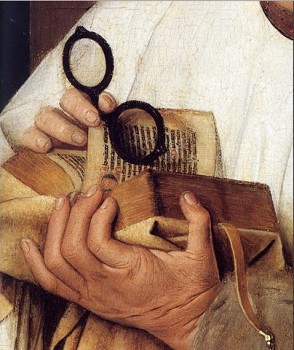
Time to read? Detail from Madonna with Canon van der Paele by Jan van Eyck (1439. The Groeninge Museum, Brugge). Wikipedia
In a recent ‘Saturday essay’ in the Helsingin Sanomat newspaper (9 August) journalist Oskari Onninen ponders the moral dilemma of pretending to be erudite. For example, who has the time to read books these days? ‘The Woolfs remain unread, Bergmans unwatched’, Onninen writes.
Our consumerist lifestyle forces us to follow the trends of ever-expanding, multiplying forms of entertainment. However, it is apparent that the need to know about culture in order to pass as a cultured, well-informed citizen still exists, to some extent at least.
According to Onninen, there is less and less time for unproductivity. ‘If one looks for measurable cost-benefit results from the reading of heavyweight fiction, the act of reading will certainly not always be worthwhile.’ Consuming art (reading books, going to art exhibitions, watching plays) requires time and effort, and how productive is that? More…
The blow-flower boy and the heaven-fixer
31 December 1984 | Archives online, Fiction, Prose
A short story from Puhalluskukkapoika ja taivaankorjaaja (‘The blow-flower boy and the heaven-fixer’, 1983). Interview by Olavi Jama
Cold.
A chill west wind came over the blue ice. It went right to the skin through woollen clothes. Shivers ran up and down the spine, made shoulders shake.
In the bank of clouds close to the horizon, right where the icebreaker had crunched open a passage to the shore, hung a pale blotch, a substitute for the sun. It gave off more chill than warmth.
Lennu’s teeth were chattering.
He wore a buttoned-up windbreaker, a hand-me-down from Gunnar, over a heavy lambswool shirt. It couldn’t keep off the cold. More…
A fifth season
30 December 2000 | Fiction, poetry
Poems from Elävän mieli (‘A mind alive’, WSOY, 1999). Introduction by Lauri Otonkoski
In sparser gusts of wind
metaphors sough through the mind,
spinning as on the much-frequented
boulevards of a great park.
Even one’s most private thoughts are as common
as public transport, what a relief,
as shared as our anatomies and our bacteria,
for there is only one thread in the skein of the Norns
and the same fabric is always being woven
from the whims of fate: is that not a relief?
Treacherous individuality suffices only
for a fingerprint.
Metaphors always the same,
but constantly born anew
like a mind alive. More…

